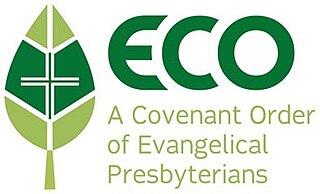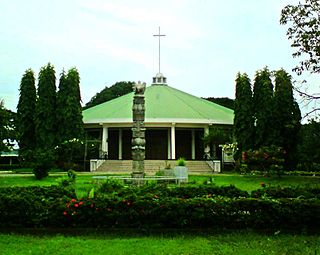Related Research Articles

The Presbyterian Church in America (PCA) is the second-largest Presbyterian church body, behind the Presbyterian Church (USA), and the largest conservative Calvinist denomination in the United States. The PCA is Reformed in theology and presbyterian in government.

Union Presbyterian Seminary is a Presbyterian seminary in Richmond, Virginia, and Charlotte, North Carolina, offering graduate theological education in multiple modalities: in-person, hybrid, and online.
The Presbyterian Church of Korea (PCK), also abbreviated as Yejang (Korean: 예장), is a Protestant denomination based in South Korea that follows Calvinist theology and the Westminster Confession of Faith. Since the 1950s, the denomination has separated into various branches of the same name due to theological and political disputes. As of 2019, 286 branches in South Korea, many of which have separated from the PCK, use the title 'Presbyterian Church of Korea'.

Covenant Theological Seminary, informally called Covenant Seminary, is the denominational seminary of the Presbyterian Church in America (PCA). Located in Creve Coeur, Missouri, it trains people to work as leaders in church positions and elsewhere, especially as pastors, missionaries, and counselors. It does not require all students to be members of the PCA, but it is bound to promote the teachings of its denomination. Faculty must subscribe to the system of biblical doctrine outlined in the Westminster Standards.
Clarence Edward Noble McCartney was a prominent conservative Presbyterian pastor and author. With J. Gresham Machen, he was one of the main leaders of the conservatives during the Fundamentalist–Modernist Controversy in the Presbyterian Church in the United States of America.

Charles Curtis McIntire Jr., known as Carl McIntire, was a founder and minister in the Bible Presbyterian Church, founder and long-time president of the International Council of Christian Churches and the American Council of Christian Churches, and a popular religious radio broadcaster, who proudly identified himself as a fundamentalist.
Bryan Chapell is an American pastor and theologian who currently serves as the Stated Clerk of the Presbyterian Church in America. He was previously the senior pastor of Grace Presbyterian Church in Peoria, Illinois. Prior to that he was president and chancellor of Covenant Theological Seminary in St. Louis, Missouri for twenty years. Chapell is also an author, lecturer, and conference speaker specializing in homiletics. He served as Moderator of the Presbyterian Church in America in 2014.
Highland College was a Christian liberal arts college in Pasadena, California, United States. It was located at 450 Avenue 64, Pasadena, California 91105.

The First Baptist Church of Manila, also known as FBCM or FirstBap, is a Fundamental Baptist church in Manila, Philippines. The church had, at first, U.S. missionaries for its pastor, but consequently, with the independence of the Philippines on July 4, 1946, the church had its first Filipino pastor, Pastor Antonio Ormeo. FBCM's current senior pastor, who took Pastor Ormeo's place, is Pastor Ebenezer T. Nacita.
James S. Gale was a Canadian Presbyterian missionary, educator and Bible translator in Korea.

ECO: A Covenant Order of Evangelical Presbyterians is an evangelical Presbyterian denomination in the United States. As a Presbyterian church, ECO adheres to Reformed theology and Presbyterian polity. It was established in 2012 by former congregations and members of the Presbyterian Church (USA), abbreviated PC(USA). Denominational disputes over theology—particularly ordination of practicing homosexuals as pastors and gay marriage—and bureaucracy led to the founding of ECO. In 2018, ECO has over 383 congregations, 103,425 covenant partners and over 500 pastors. ECO churches are egalitarian in beliefs and ordain women as pastors and elders.

Union Theological Seminary is the oldest Protestant seminary in the Philippines.
The church history dates back to 1948, the foundation of the DaeHan Seminary and with Rev. Kim Chi-sun, Pastor Kim Su-do, Rev. Yun Phil-sung started evening courses for the formation of the candidate of ministry. In 1960 the HapDong and TongHap split. Rev. Kim Chi-sun who belonged to hapDong founded the Bible Presbyterian Church in Korea. Soon tension arose between the Seminary and the Bible Presbyterian Church. In 1968 Kim withdrew from ICCC. Kim Chi-sun was running the Daeshin Seminary by himself. He tried to get his son appointed as director of the seminary. This idea was opposed by the professor of the Seminary, he was Choi Soon-jik who started with his follower the HapDongJinRi denomination, the leading figure was Huh Kwang-jae. In 1972 Kim Chi-sun and his son withdrew the denomination. The Daeshin group later revised its constitution. In 1974 the church adopted the "Declaration of the Church" and amended the new constitution in 1976. It joined the Council of Presbyterian Churches in Korea in 1980 and the World Alliance of Reformed Churches in 1992. Daeshin has experienced steady growth in recent years. It has 140,000 members in 1,170 congregations, 30 Presbyteries and a General Assembly. The church subscribes to the Apostles Creed and the Westminster Confession. Member of the World Communion of Reformed Churches.
Douglas W. Oldenburg was a Christian pastor and President Emeritus at Columbia Theological Seminary in the US. He served as the moderator of the 210th General Assembly of the Presbyterian Church (USA) in 1998.
Robert Gibson Rayburn was an American pastor and college president.
Quek Swee Hwa is a Singaporean pastor and theologian. He was the founding principal of the Biblical Graduate School of Theology. He served as the General Secretary of the International Council of Christian Churches (ICCC), succeeding his father Quek Kiok Chiang in the office. He went on to become the Second Vice President of the ICCC until its 21st World Congress in June 2023 but remains as a member of its Executive Committee.

Rachel Henderlite was an American religious leader who was the first woman to be ordained a pastor of the Presbyterian Church in the United States (PCUS), which later merged with the United Presbyterian Church in the United States of America (1983) to become the Presbyterian Church U.S.A. She held professorships at several American colleges and seminaries, wrote six books, and was active in various ecumenical efforts.
Lynn Gray Gordon, D.D., was an American pastor, Christian educator, army chaplain, and college president.
The Presbyterian University and Theological Seminary (PUTS) is a university and seminary located in the Gwangjin District, Seoul, South Korea. PUTS is affiliated with the Presbyterian Church of Korea. Its school motto is ‘Pietatis et Scientia’: ‘Piety and Knowledge’.
References
- ↑ Carlson, Howard (2012). "Clyde Johnstone Kennedy: Casting a Long Shadow for the Cause of Christ" (PDF). Redeeming the Time.
- ↑ "Kennedy, Earl C. 1901-1988". iagenweb.org. Retrieved 2016-07-04.
- ↑ Rhoads, Gladys Titzck, Nancy Titzck Anderson (2012). McIntire: Defender of Faith and Freedom. p. 159. ISBN 9781619962323.
{{cite book}}: CS1 maint: multiple names: authors list (link)